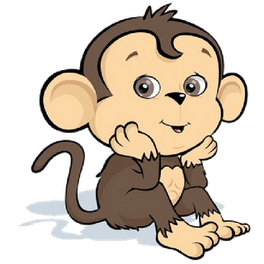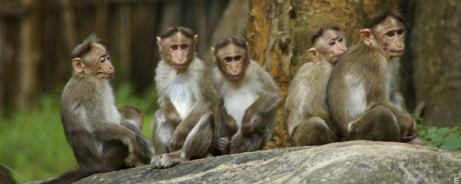
In 1952, on the island of Koshima, scientists were providing monkeys with sweet potatoes dropped in the sand. The monkey liked the taste of the raw sweet potatoes, but they found the dirt unpleasant.
An 18-month-old female named Imo found she could solve the problem by washing the potatoes in a nearby stream. She taught this trick to her mother. Her playmates also learned this new way and they taught their mothers too.
This cultural innovation was gradually picked up by various monkeys before the eyes of the scientists. Between 1952 and 1958 all the young monkeys learned to wash the sandy sweet potatoes to make them more palatable. Only the adults who imitated their children learned this social improvement. Other adults kept eating the dirty sweet potatoes.
Then something startling took place. In the autumn of 1958, a certain number of Koshima monkeys were washing sweet potatoes -- the exact number is not known. Let us suppose that when the sun rose one morning there were 99 monkeys on Koshima Island who had learned to wash their sweet potatoes. Let's further suppose that later that morning, the hundredth monkey learned to wash potatoes.
THEN IT HAPPENED!
By that evening almost every monkey in the tribe was washing sweet potatoes before eating them. The added energy of this hundredth monkey somehow created an ideological breakthrough!
The scientists were even more surprised to see that the knowledge of washing sweet potatoes before eating them, then jumped over the sea. Colonies of monkeys living on other islands and the mainland troop of monkeys at Takasakiyama intuitively began washing their sweet potatoes before eating them. There was no way any monkey could have migrated across the sea to the other islands and tell them of this new technique. And yet overnight, the monkeys on all neighbouring islands had also learned how to wash the sweet potatoes before eating them.

The exact number may vary. Scientists could not accurately ascertain what the critical number was for these monkeys. But they knew that the phenomenon was real and called it the "Hundredth Monkey Effect."
They documented that when a limited number of people believe or know something, it remains the conscious property of these individuals. But there is a point at which if only one more person tunes in to this knowledge or awareness, it suddenly seems to become part of the collective consciousness. Then people can almost instinctively tune into this awareness and pick up the knowledge.
Ken Keyes, Jr. in his book "The hundredth monkey" says :
We are all connected. Carl Jung called it the 'collective unconscious'.
The 100th Monkey effect points out our power and responsibility as individuals. You do not have to wait until others open their hearts. Instead you could begin doing things now that are so desperately needed for the conscious unfolding of your life — and the survival of our species. You will begin to discover the miracle of your full potential as a human being. Your energy can tip the scales when you add it to thousands of others' — merging, slowly raising our collective consciousness to the point of power when it makes the all-important difference!
This survival energy spreads far beyond those involved and touches every life on Earth!
The change in you is already taking place!
Read the complete book as written by the Ken Keyes, Jr. here - The 100th Monkey full book
This piece was adapted from http://www.wowzone.com/monkey.htm

